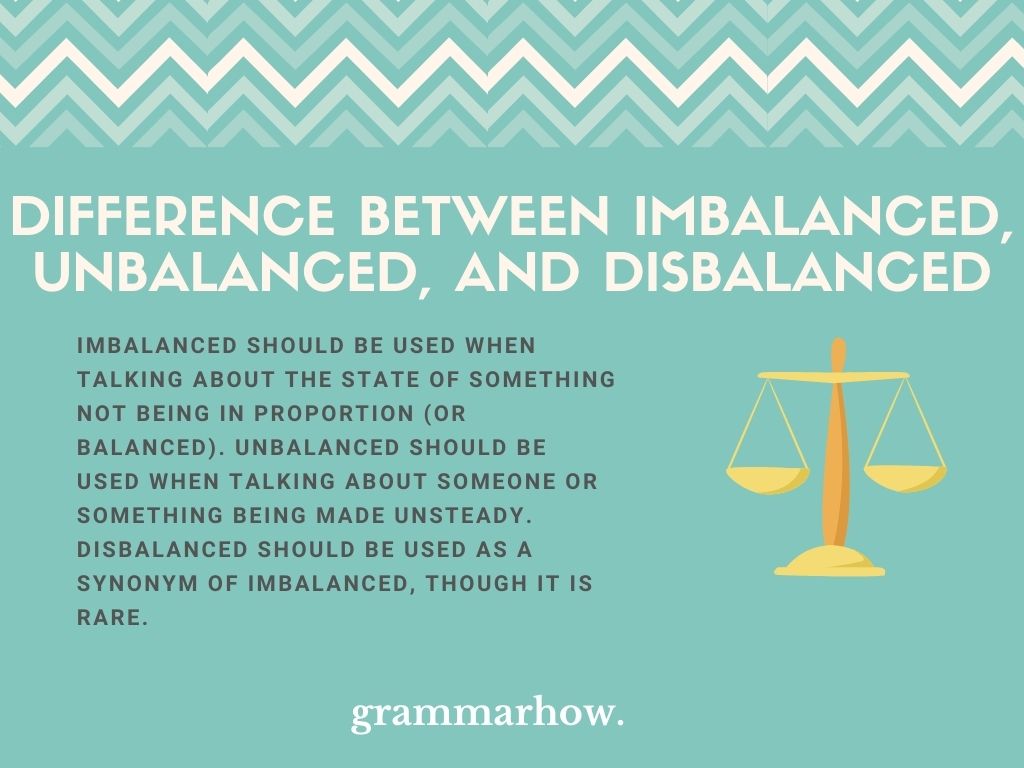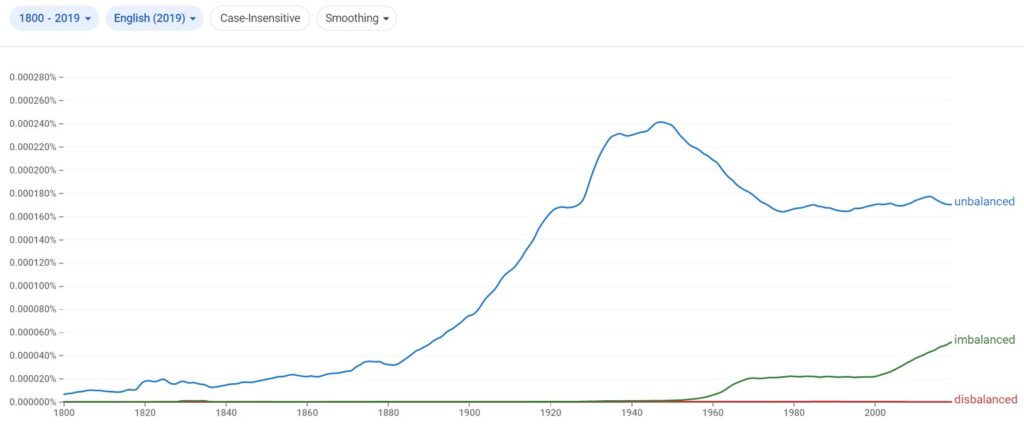The words “imbalanced,” “unbalanced,” and “disbalanced” all come with similar spelling variations, though the prefix changes for each word. This prefix impacts the meaning of a few of the words, so we thought we’d talk you through them.
What Is The Difference Between Imbalanced, Unbalanced, And Disbalanced?
Imbalanced should be used when talking about the state of something not being in proportion (or balanced). Unbalanced should be used when talking about someone or something being made unsteady. Disbalanced should be used as a synonym of imbalanced, though it is rare.

Below, we have provided a graph that shows the usage of imbalanced, unbalanced, and disbalanced through the last 200 years.

From this we can see that “unbalanced” is by far the most prominent word to use. This is despite the fact that “unbalanced” and “imbalanced” have two different meanings.
“Imbalanced” is being used more over the time period, which could imply that people are becoming aware of the different meanings of “unbalanced” and “imbalanced”
We are also able to see that “disbalanced” is almost never used in the English language.
7 Examples Of How To Use “Imbalanced” In A Sentence
We use “imbalanced” as a noun or adjective. It’s used when we want to talk about the state or situation of something not being in proportion to something else. If there’s a noticeable difference between the two things, we can talk about an imbalance or imbalanced situation.
- An imbalanced society has plagued us since the dawn of time.
- Imbalanced wealth taxes is what makes it so hard to be poor in this world.
- You’re working with an imbalanced system. You’ve got to find a suitable middle ground.
- You’re mentally imbalanced, and you need help!
- I don’t try hard enough with my nutrition and have an imbalanced diet.
- You have imbalanced ideas. You need to focus your thoughts on one main point.
- We’ve found many imbalanced school grades. We need to focus on the poorer marks.
In each of these cases, we’re using “imbalanced” as a noun or adjective to discuss the disproportionate level (or lack of balance) among a state or situation.
7 Examples Of How To Use “Unbalanced” In A Sentence
In contrast, “unbalanced” is used as a verb when talking about something that has lost its balance. The thing can be someone or something, and it’s used when they lose their footing or are made unsteady by external forces.
- He was unbalanced on his feet walking out the door.
- I was unbalanced after all the alcohol I drank last night.
- She’s unbalanced the plate, and it’s about to fall!
- Your car tires are unbalanced. That’s why your car is wobbling down the road.
- Your trophies are unbalanced; you should fix your shelf before they fall down.
- I’ve always been unbalanced while I run. It’s a genetic condition.
- They’re unbalanced every time they come off that rollercoaster.
We use it as a verb to show that someone or something is no longer stable. Even if that thing has never been stable before, the verb still works well to explain this.
7 Examples Of How To Use “Disbalanced” In A Sentence
What about “disbalanced” then? We’ve left it till last because it’s the least popular choice of the three. It’s synonymous with “imbalance,” meaning that all the examples we shared for “imbalanced” will apply here. However, this word is very rarely used, even though some dictionaries recognize it.
- This is a disbalanced society, and it needs adjusting.
- We have found disbalanced numbers, and we need to fix them.
- Your attitude is disbalanced, and your behavior needs realignment.
- The pay gap between genders show a disbalanced society.
- The government has been disbalanced for years.
- Religion leads to a lot of disbalances in the world.
- We’ve been in disbalanced situations for as long as I can remember.
The “dis-” prefix means “lack of.” When we use “disbalanced,” we’re saying there’s a “lack of balance” and using it in the noun form.
Is It Imbalanced Or Unbalanced Diet?
Let’s look closer at some specific scenarios to see which word makes the most sense.
When we apply “imbalanced” or “unbalanced” to the word “diet,” both words work in different situations. An “imbalanced diet” is a state that we know we need to change. An “unbalanced diet” is a diet that’s been made unsteady (usually talking about a specific day).
If we’re writing it as a noun, then “imbalanced diet” is correct. It’s also the more common way to write the phrase. However, “unbalanced diet” also makes sense, but only when we’re using the verb “unbalanced” to show that it has been made unsteady. Usually, that means it’s a different diet to the one we typically have, but we’re aware it’s not a particularly healthy one.
Is It Imbalanced Or Unbalanced Data?
When looking at data points, the most common way to write about unsteady ones is by using the verb form “unbalanced.” You can write about data that is disproportionate using the noun form “imbalanced.”
“Unbalanced data” is the correct form if we’ve done something to change the data at the time (verb form). “Imbalanced data” is the correct form if we’re talking about data results overall and how there’s a noticeable proportional difference between them.
The context is what makes the difference between the two phrases. Make sure you’ve understood it before using either one.
Is It Mentally Imbalanced Or Unbalanced?
If you’re talking about somebody who has a mental illness, then you would use the noun form and say they are “mentally imbalanced.” If you’re talking about someone whose mental state isn’t as straightforward as it usually is, then you’d say “mentally unbalanced.”
It’s worth mentioning that neither of these phrases is polite for you to say. You should avoid using them, especially in front of the person you’re talking about. You will end up insulting them if you’re not careful.
Quiz: Have You Mastered The Imbalanced, Unbalanced, Or Disbalanced Grammar?
Let’s finish with a quiz to see what you’ve learned about the differences between the three words. Even though they’re all words with “balance” as a base form, they use different prefixes.
Once you’ve read through the article, see if you can work out which prefix works for which question and compare your answers at the end.
- We live in an (A. imbalanced / B. unbalanced / C. disbalanced) society.
- You have been (A. imbalanced / B. unbalanced / C. disbalanced) for some time now.
- Alcohol makes me feel (A. imbalanced / B. unbalanced / C. disbalanced).
- Society is (A. imbalanced / B. unbalanced / C. disbalanced) and needs drastic action to change it.
- Why is everything in life so (A. imbalanced / B. unbalanced / C. disbalanced)?
Quiz Answers
- A / C
- B
- B
- A / C
- A / C

Martin holds a Master’s degree in Finance and International Business. He has six years of experience in professional communication with clients, executives, and colleagues. Furthermore, he has teaching experience from Aarhus University. Martin has been featured as an expert in communication and teaching on Forbes and Shopify. Read more about Martin here.
